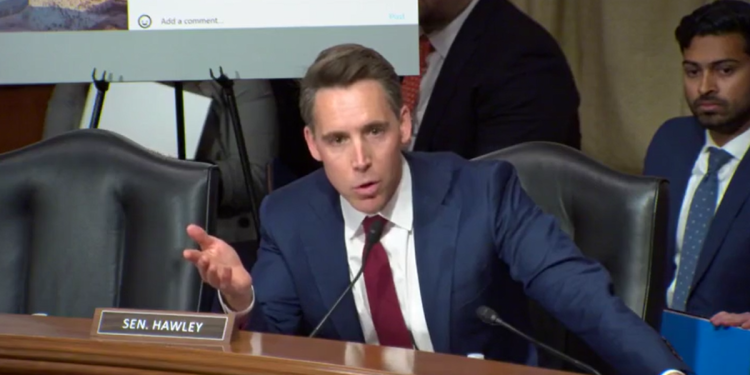
Sen. Josh Hawley, R-Mo., is urging global consulting firm McKinsey & Company to hand over ‘comprehensive documentation’ showcasing its past or present contracts with the Chinese government or its affiliates.
‘Your company alleges that its purpose is to ‘help create positive, enduring change in the world.’ You should know that helping totalitarian foreign powers undermine America does not meet that bar,’ Hawley wrote in the letter. ‘This ugly record can—and must—inform whether the American government, or anyone else, can safely trust your company’s services in the future.’
During a hearing earlier this month, McKinsey global partner Robert Sternfels testified in response to Hawley’s questioning that the company ‘never worked with the Chinese Communist Party or the central government in China, to the best of my knowledge.’
However, a Financial Times report last week found otherwise. The investigation found that the think tank Urban China Inititative, helmed by McKinsey, recommended strategies to the Chinese regime in 2015, urging closer collaboration between businesses and the military.
‘To be clear, this was not just any consulting work. It was the creation of a detailed roadmap for the Chinese government’s long-term scientific and technical development, including plans to blur the lines between civilian and military technological applications,’ Hawley wrote. ‘Among other recommendations, the book also advocated undercutting non-Chinese companies through explicitly anticompetitive practices—such as subsidizing domestic internet companies’ bid to ‘eventually take control of the industry from foreign firms.”
McKinsey contributed to China’s 13th Five-Year Plan book — and also provided a forward to the book — which has sparked tensions with the U.S. due to policies like Made in China 2025, an initiative to position China as the global powerhouse in high-tech industries.
‘Indeed, this McKinsey-led product directly contributed to China’s Made in China 2025 industrial plan, which accelerated Chinese trade abuses and the deterioration of U.S.-China relations,’ Hawley wrote.
Hawley reintroduced a bill, called the Time to Choose Act, which aims to address conflicts of interest in federal contracting and prohibits consulting firms like McKinsey & Company from simultaneously contracting with both the U.S. government and entities associated with the People’s Republic of China.
The legislation was first rolled out in 2022 after an NBC report unveiled that McKinsey was also engaged in contracts with Chinese state-owned entities which had been blacklisted by the federal government over national security threats. The bill failed to gain momentum at the time.
If passed, the bill would also enforce penalties on consulting firms found to be intentionally concealing or misrepresenting contracts with Chinese entities.
In December, McKinsey agreed to pay $78 million to settle claims by U.S. health insurers and benefit plans that its work with drug companies helped fuel an epidemic of opioid addiction.
The agreement was the final of a series of settlements McKinsey reached to resolve lawsuits over the U.S. opioid epidemic. The firm previously paid $641.5 million to resolve claims by state attorneys general and another $230 million to resolve claims by local governments. It has also settled cases brought by Native American tribes.
Fox News Digital reached out to Sternfels for comment.
Fox News’ Landon Mion contributed to this report.

Sen. Josh Hawley, R-Mo., is urging global consulting firm McKinsey & Company to hand over ‘comprehensive documentation’ showcasing its past or present contracts with the Chinese government or its affiliates.
‘Your company alleges that its purpose is to ‘help create positive, enduring change in the world.’ You should know that helping totalitarian foreign powers undermine America does not meet that bar,’ Hawley wrote in the letter. ‘This ugly record can—and must—inform whether the American government, or anyone else, can safely trust your company’s services in the future.’
During a hearing earlier this month, McKinsey global partner Robert Sternfels testified in response to Hawley’s questioning that the company ‘never worked with the Chinese Communist Party or the central government in China, to the best of my knowledge.’
However, a Financial Times report last week found otherwise. The investigation found that the think tank Urban China Inititative, helmed by McKinsey, recommended strategies to the Chinese regime in 2015, urging closer collaboration between businesses and the military.
‘To be clear, this was not just any consulting work. It was the creation of a detailed roadmap for the Chinese government’s long-term scientific and technical development, including plans to blur the lines between civilian and military technological applications,’ Hawley wrote. ‘Among other recommendations, the book also advocated undercutting non-Chinese companies through explicitly anticompetitive practices—such as subsidizing domestic internet companies’ bid to ‘eventually take control of the industry from foreign firms.”
McKinsey contributed to China’s 13th Five-Year Plan book — and also provided a forward to the book — which has sparked tensions with the U.S. due to policies like Made in China 2025, an initiative to position China as the global powerhouse in high-tech industries.
‘Indeed, this McKinsey-led product directly contributed to China’s Made in China 2025 industrial plan, which accelerated Chinese trade abuses and the deterioration of U.S.-China relations,’ Hawley wrote.
Hawley reintroduced a bill, called the Time to Choose Act, which aims to address conflicts of interest in federal contracting and prohibits consulting firms like McKinsey & Company from simultaneously contracting with both the U.S. government and entities associated with the People’s Republic of China.
The legislation was first rolled out in 2022 after an NBC report unveiled that McKinsey was also engaged in contracts with Chinese state-owned entities which had been blacklisted by the federal government over national security threats. The bill failed to gain momentum at the time.
If passed, the bill would also enforce penalties on consulting firms found to be intentionally concealing or misrepresenting contracts with Chinese entities.
In December, McKinsey agreed to pay $78 million to settle claims by U.S. health insurers and benefit plans that its work with drug companies helped fuel an epidemic of opioid addiction.
The agreement was the final of a series of settlements McKinsey reached to resolve lawsuits over the U.S. opioid epidemic. The firm previously paid $641.5 million to resolve claims by state attorneys general and another $230 million to resolve claims by local governments. It has also settled cases brought by Native American tribes.
Fox News Digital reached out to Sternfels for comment.
Fox News’ Landon Mion contributed to this report.
















